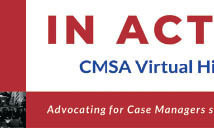October 11 – 17th was National Case Management Week, although many of us co-opt the entire month of October to recognize case managers with celebrations, proclamations, educational programs, awards, and many other activities. The CMSA 2020 theme was, “Case Managers Can________ (fill in the blank).” While sometimes it seems that case managers are asked to do a lot, the truth is that case managers CAN do a lot! There may be a question of “should” we, but there is no question about what case managers can accomplish when faced with complex patient conditions, complicated client situations, and transformational organizational changes.
This month’s theme is especially poignant as I reflect on the unique stories shared by many during this season of crisis management to the COVID-19 pandemic response. Case managers across the nation have been asked to “fill in” for atypical roles such as clinical nursing and social work assignments at the point of care. Case managers have “filled in” for supervisory positions that have responsibilities across departments and are not restricted to case management alone. Case managers are “filling in” as educators and trainers for staff who require instruction in advanced infection control practices. Some of you are “filling in” as COVID-19 contact tracers, testers, database managers, and quality control experts. A few of you have “filled in” as human resource extensions as facilities surged capacity with new hires to manage demand for overflow patient units. Yes, case managers can “fill in”; and yes, there is a question of should we fill in. But I submit that crisis management mandates an “all in” approach that does not compromise safety or ethical principles. And the fact that case managers have a breadth and depth of experience in most things healthcare, organizations are confident that case managers can!
Case managers are not only “filling in” for atypical clinical roles, but they are also “filling in” as adjunct teachers with their children’s in-home academic schedules as a result of COVID-19 school closures. They are fulfilling the role of business owner and household executive, delegating new responsibilities to partners, spouses, significant others and family members to create coordinated daily plans. Case managers are “filling in” as health coaches, counselors, and wellness experts for friends, family, and colleagues. Many case managers, myself included, are “filling in” as community advocates to organize programs that support health maintenance through food distribution, wellness checks, and health education. Answering the call wherever the need resides, case managers are using their knowledge, expertise, and sheer determination to demonstrate how case managers can_______.
As we highlight this issue’s focus on hospice and palliative care, I am reminded that case managers are “filling in” for loved ones as they position e-devices for patients to video chat with family while recovering in a facility where visitors are not allowed. Many case managers are prepared to coordinate end of life care, but case managers are also “filling in” for family and chaplains as they hold a patient’s hand during the final moments of life.
The need for flexibility and professional agility in case/care management has been great during these last 10 months, but case managers’ willingness and ability to step into atypical roles have made a significant impact in the lives of individual patients, scores of families, and many healthcare institutions. In the weeks and months to come, case managers will reflect on the atypical, non-traditional, and new roles performed in response to the pandemic and resulting care demands. A deliberate and rigorous discussion should ensue regarding what changes, if any, are made to case management practice, organizational boundaries, roles and responsibilities, and leadership expectations for a cadre of professionals who consistently demonstrate that they can perform beyond status quo expectations. The conclusion must involve strategies to ensure case managers are the decision-makers about any changes to the practice of case management. CMSA is positioning itself as a member association that will drive solutions and advocate for professional case manager leadership roles at the pinnacle of decision-making entities. Join us for the journey!





